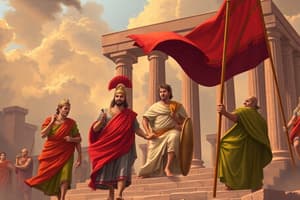Podcast
Questions and Answers
What was the main purpose of the first triumvirate?
What was the main purpose of the first triumvirate?
- To create a monarchy
- To oppose Caesar
- To have Caesar elected to the consulship (correct)
- To support the Senate
Who were the three members of the first triumvirate?
Who were the three members of the first triumvirate?
Julius Caesar, Marcus Licinius Crassus, Gnaeus Pompeius (Pompey)
The first triumvirate was a public alliance.
The first triumvirate was a public alliance.
False (B)
What event contributed to the collapse of the first triumvirate?
What event contributed to the collapse of the first triumvirate?
What significant title did Caesar accept in 44 BC?
What significant title did Caesar accept in 44 BC?
On 15th March 44 BC, Julius Caesar was assassinated by approximately _____ senators.
On 15th March 44 BC, Julius Caesar was assassinated by approximately _____ senators.
What was one of the consequences of the first triumvirate?
What was one of the consequences of the first triumvirate?
What happened to Pompey's wife Julia?
What happened to Pompey's wife Julia?
What was the relationship between Caesar and Pompey during the civil wars?
What was the relationship between Caesar and Pompey during the civil wars?
What effect did the strong relations in the triumvirate have before they weakened?
What effect did the strong relations in the triumvirate have before they weakened?
Flashcards are hidden until you start studying
Study Notes
The First Triumvirate Overview
- Formed in 60 BC between Julius Caesar, Marcus Licinius Crassus, and Gnaeus Pompeius (Pompey) as a secret political alliance.
- Purpose was to oppose legislation that any individual might disapprove, enhancing their collective power against the Senate.
Influences and Power Dynamics
- Crassus wielded more influence in the Senate, while Pompey held significant sway with the populace.
- Crassus and Pompey’s powers gradually shifted towards Caesar, especially after the decline of their individual influences.
Motivations Behind the Alliance
- The triumvirate aimed to elect Caesar to consul, enabling him to push through their legislative proposals with support from Crassus' equites and Pompey's veteran officers.
Decline of Relations
- Post-59 BC, relationships weakened as tension escalated, especially due to Caesar’s absence in Gaul.
- Clashes between supporters of Pompey and Crassus became increasingly common, reflecting internal fractures within the alliance.
Factors Leading to Collapse
- Key deaths: Julia (Pompey’s wife and Caesar’s daughter) in 54 BC and Crassus in Parthia in 53 BC heightened tensions.
- Jealousy between Pompey and Caesar grew, with the Senate fearing Caesar's power and blocking his consulship in 48 BC, complicating his position in Gaul.
The Civil Wars
- The Senate supported Pompey as sole consul, positioning him to command against Caesar.
- Caesar emerged as a military hero, culminating in conflict that ultimately led to his victory over Pompey.
Aftermath of the Conflict
- Caesar declared himself the undisputed leader of Rome and accepted dictatorship in 44 BC, implementing numerous reforms for Rome and its provinces.
Caesar’s Downfall
- His governance alienated many senators who distrusted his intentions toward monarchy.
- Assassinated on 15th March 44 BC (The Ides of March) by around sixty senators concerned about his ambitions.
Legacy of the Triumvirate
- Demonstrated the potential for powerful figures to coalesce and wield absolute control in Rome.
- The initial success quickly dissolved due to jealousy and discord, ultimately leading to the downfall of its members.
- Set a precedent for a second triumvirate, formalizing political alliances in Roman governance.
Studying That Suits You
Use AI to generate personalized quizzes and flashcards to suit your learning preferences.




